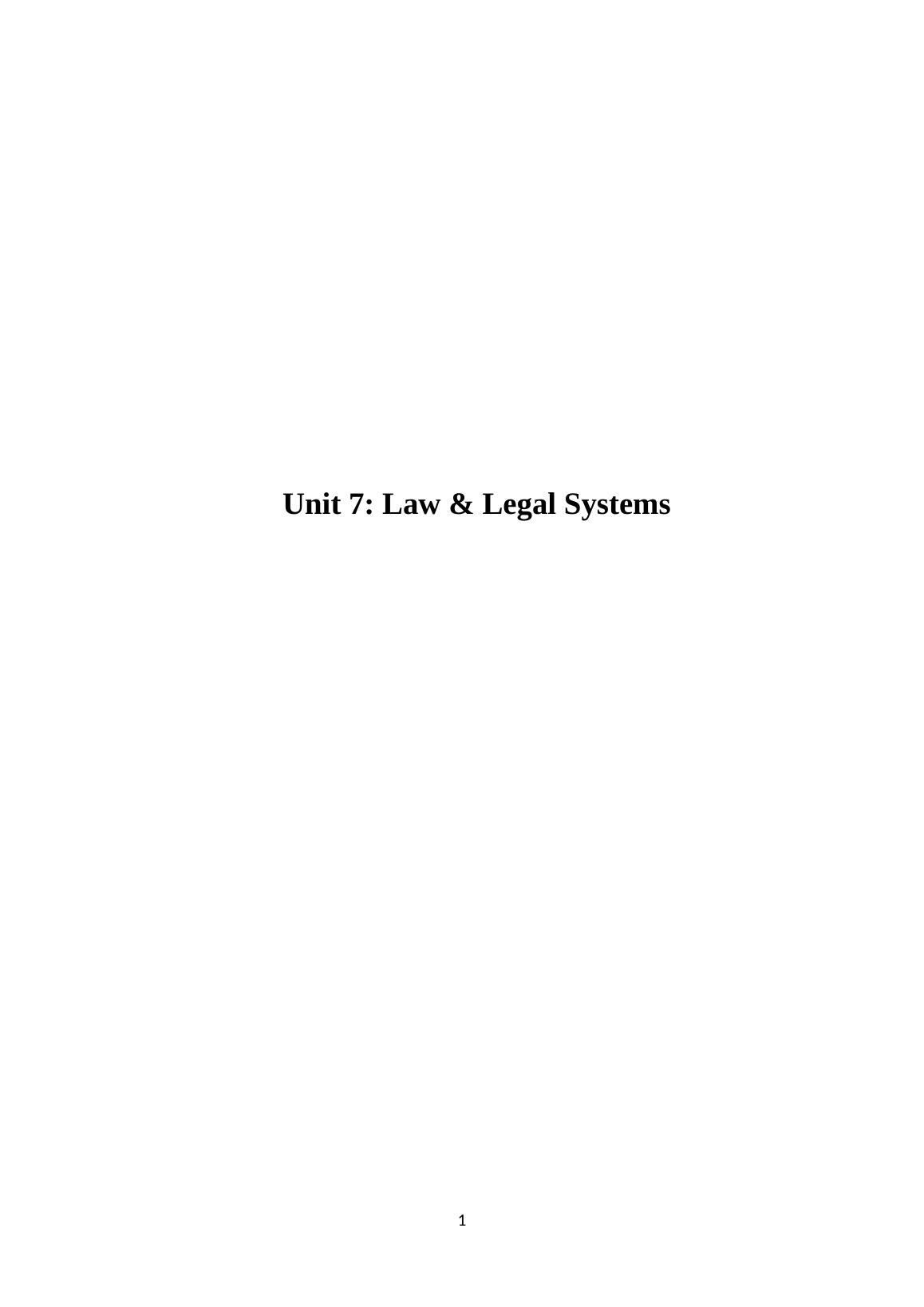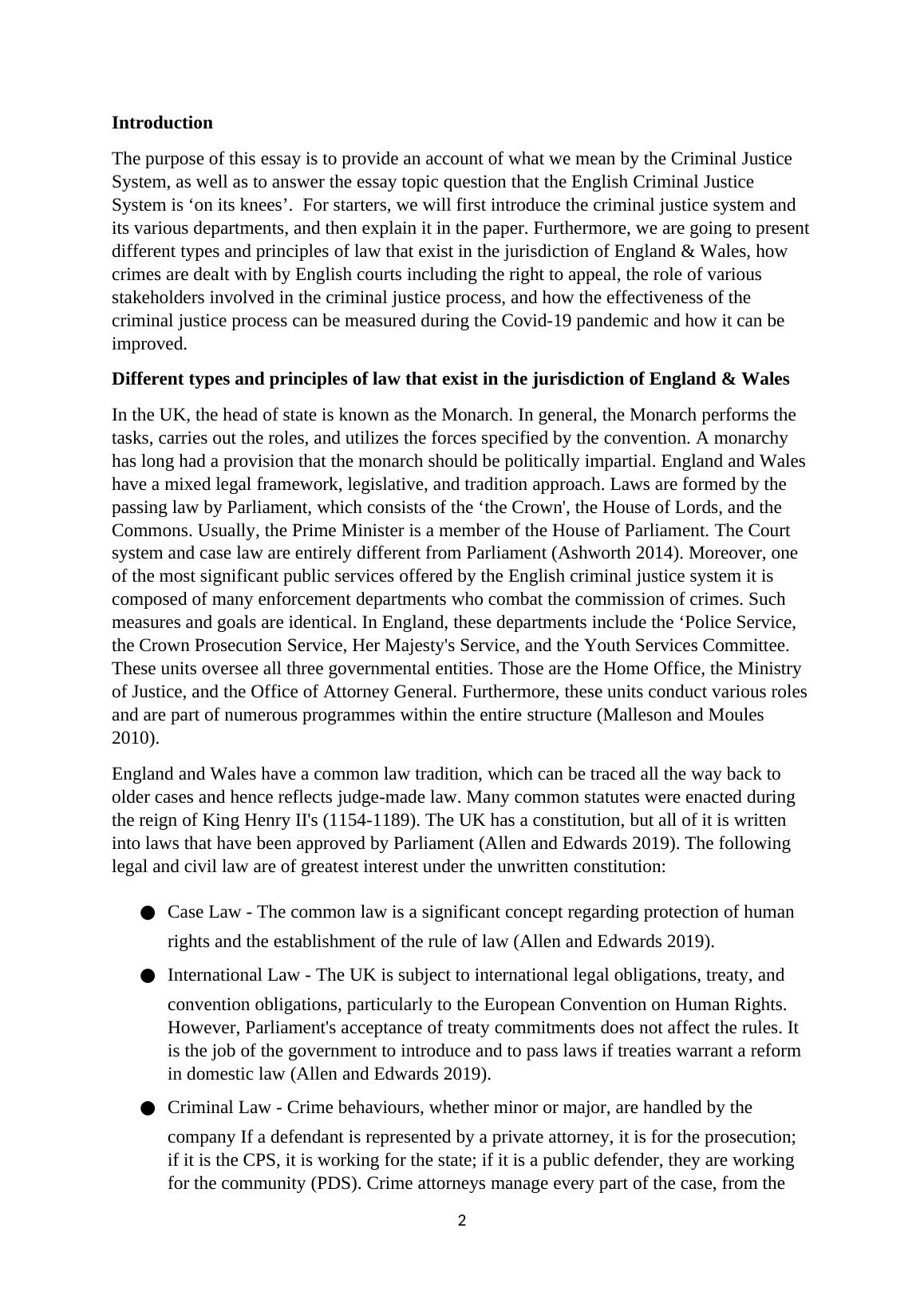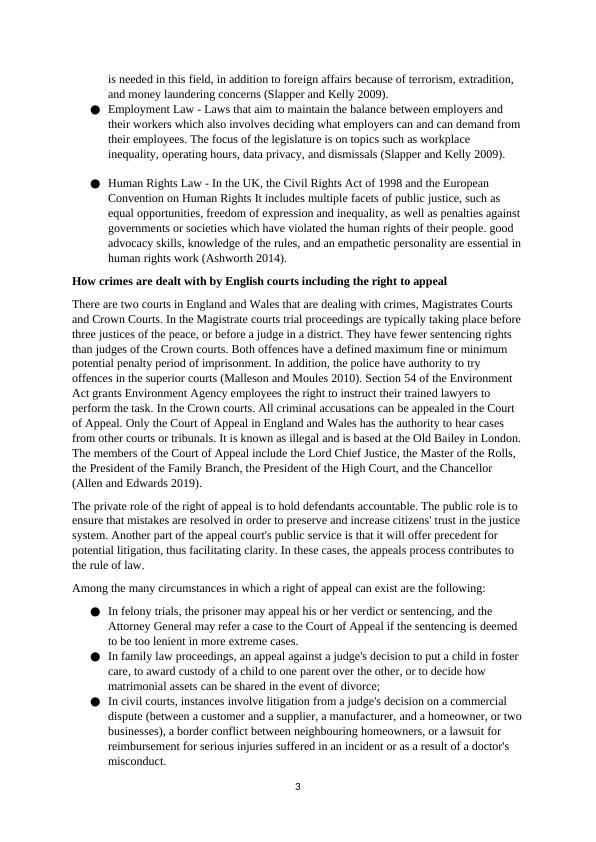Unit 7: Law & Legal Systems Assignment
Added on 2021-04-16
7 Pages3045 Words198 Views
Unit 7: Law & Legal Systems1

IntroductionThe purpose of this essay is to provide an account of what we mean by the Criminal Justice System, as well as to answer the essay topic question thatthe English Criminal Justice System is ‘on its knees’. For starters, we will first introduce the criminal justice system and its various departments, and then explain it in the paper. Furthermore, we are going to presentdifferent types and principles of law that exist in the jurisdiction of England & Wales, how crimes are dealt with by English courts including the right to appeal, the role of various stakeholders involved in the criminal justice process, and how the effectiveness of the criminal justice process can be measured during the Covid-19 pandemic and how it can be improved. Different types and principles of law that exist in the jurisdiction of England & WalesIn the UK, the head of state is known as the Monarch. In general, the Monarchperforms the tasks, carries out the roles, and utilizes the forces specified by the convention. A monarchy has long had a provision that the monarch should be politically impartial. England and Wales have a mixed legal framework, legislative, and tradition approach. Laws are formed by the passing law by Parliament, which consists of the ‘the Crown', the House of Lords, and the Commons. Usually, the Prime Minister is a member of the House of Parliament. The Court system and case law are entirely different from Parliament (Ashworth 2014). Moreover, one of the most significant public services offered by the Englishcriminal justice system it is composed of many enforcement departments who combat the commission of crimes. Such measures and goals are identical. In England, these departments include the ‘Police Service, the Crown Prosecution Service, Her Majesty's Service, and the Youth Services Committee. These units oversee all three governmental entities. Those are the Home Office, the Ministry of Justice, and the Office of Attorney General. Furthermore, these units conduct various rolesand are part of numerous programmes within the entirestructure (Malleson and Moules 2010). England and Wales have a common law tradition, which can be traced all the way back to older cases and hence reflects judge-made law. Many common statutes were enacted during the reign of King Henry II's (1154-1189). The UK has a constitution, but all of it is written into laws that have been approved by Parliament (Allen and Edwards 2019). The following legal and civil law are of greatest interest under the unwrittenconstitution:●Case Law - The common law is a significant concept regarding protection of human rights and the establishment of the rule of law (Allen and Edwards 2019).●International Law - The UK is subject to international legal obligations, treaty, and convention obligations, particularly to the European Convention on Human Rights. However, Parliament's acceptance of treaty commitments does not affect the rules. It is the job of the government to introduce and to pass laws if treaties warrant a reform in domestic law (Allen and Edwards 2019).●Criminal Law - Crime behaviours, whether minor or major, are handled by the company If a defendant is represented by a private attorney, it is for the prosecution; if it is the CPS, it is working for the state; if it is a public defender, they are working for the community (PDS). Crime attorneys manage every part of the case, from the initial investigation to possible post-conviction appeal. Formal interpretation of laws 2

is needed in this field, in addition to foreign affairs because of terrorism, extradition, and money laundering concerns (Slapper and Kelly 2009).●Employment Law - Laws that aim to maintain the balance between employers and their workers which also involves deciding what employers can and can demand fromtheir employees. The focus of the legislature is on topics such as workplace inequality, operating hours, data privacy, and dismissals (Slapper and Kelly 2009).●Human Rights Law - In the UK, the Civil Rights Act of 1998 and the European Convention on Human Rights It includes multiple facets of public justice, such as equal opportunities, freedom of expression and inequality, as well as penalties against governments or societies which have violated the human rights of their people. good advocacy skills, knowledge of the rules, and an empathetic personality are essential inhuman rights work (Ashworth 2014).How crimes are dealt with by English courts including the right to appealThere are two courts in England and Wales that are dealing with crimes, Magistrates Courts and Crown Courts. In the Magistrate courts trial proceedings are typically taking place beforethree justices of the peace, or before a judge in a district. They have fewer sentencing rights than judges of the Crown courts. Both offences have a defined maximum fine or minimum potential penalty period of imprisonment. In addition, the police have authority to try offences in the superior courts (Malleson and Moules 2010). Section 54 of the Environment Act grants Environment Agency employees the right to instruct their trained lawyers to perform the task. In the Crown courts. All criminal accusations can be appealed in the Court of Appeal. Only the Court of Appeal in England and Wales has the authority to hear cases from other courts or tribunals. It is known as illegal and is based at the Old Bailey in London.The members of the Court of Appeal include the Lord Chief Justice, the Master of the Rolls, the President of the Family Branch, the President of the High Court, and the Chancellor (Allen and Edwards 2019). The private role of the right of appeal is to hold defendants accountable. The public role is to ensure that mistakes are resolved in order to preserve and increase citizens' trust in the justice system. Another part of the appeal court's public service is that it will offer precedent for potential litigation, thus facilitating clarity. In these cases, the appeals process contributes to the rule of law.Among the many circumstances in which a right of appeal can exist are the following:●In felony trials, the prisoner may appeal his or her verdict or sentencing, and the Attorney General may refer a case to the Court of Appeal if the sentencing is deemed to be too lenient in more extreme cases.●In family law proceedings, an appeal against a judge's decision to put a child in foster care, to award custody of a child to one parent over the other, or to decide how matrimonial assets can be shared in the event of divorce;●In civil courts, instances involve litigation from a judge's decision on a commercial dispute (between a customer and a supplier, a manufacturer, and a homeowner, or twobusinesses), a border conflict between neighbouringhomeowners, or a lawsuit for reimbursement for serious injuries suffered in an incident or as a result of a doctor's misconduct.3

End of preview
Want to access all the pages? Upload your documents or become a member.
Related Documents
The Legal system and UK legal system.lg...
|13
|2583
|25
The Criminal Justice System in England & Waleslg...
|11
|4151
|32
Legal System for Business: Classifications of Law, Source of Law, UK Law Making Process, Employment Lawlg...
|8
|2645
|72
Legal Systems of Europelg...
|7
|1591
|15
Legal Systems in the UK Pdflg...
|7
|1780
|388
Legal System for Business: UK Law and Employment Lawlg...
|9
|2772
|66
